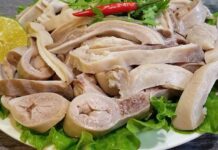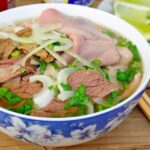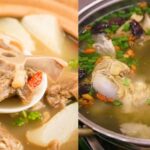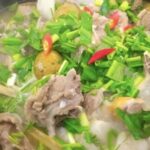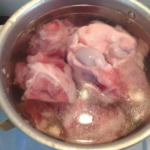Pho, the iconic Hanoi beef noodle soup, has long been considered a staple of Vietnamese cuisine. Its appeal goes beyond its savory and aromatic flavors, as it also embodies the cultural essence and culinary heritage of the nation.
However, preparing authentic Hanoi-style pho is no easy feat. It requires meticulous attention to detail, from carefully selecting the freshest ingredients to mastering the art of broth-making.
Below are some secrets to help you create a delicious and traditional bowl of pho:
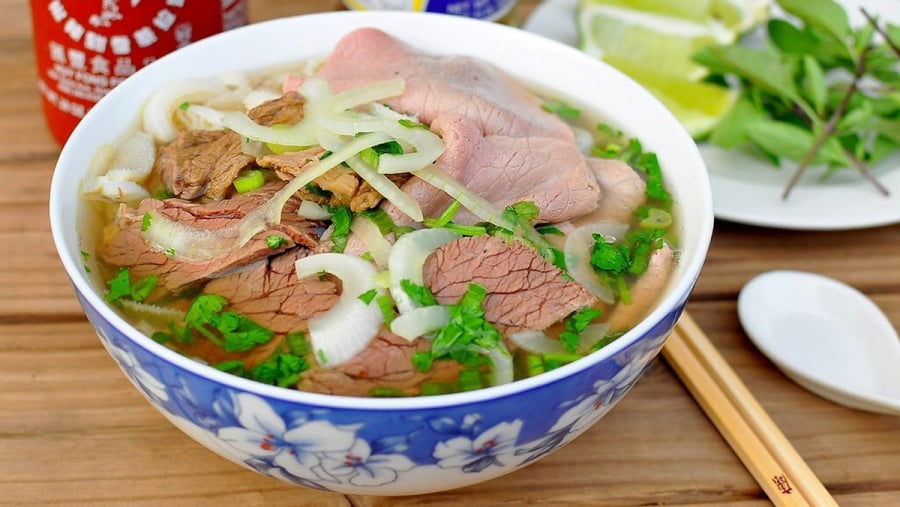
Beef Pho
Select the Freshest Ingredients
The first secret to achieving the perfect pho lies in choosing the freshest ingredients. Beef should be carefully selected, typically using beef brisket, shank, or chuck. The meat should be tender yet retain a natural sweetness and crispness.
For the broth, beef bones are essential. Opt for beef marrow bones to achieve a clear and sweet broth without being overly rich. Additionally, including a few beef rib bones will enhance the flavor. The quality of the beef bones plays a crucial role in determining the overall taste of the broth.
Moreover, spices such as shallots, ginger, cinnamon, star anise, cardamom, fennel, and peppercorns are indispensable in creating the distinctive flavor profile of pho. Ensure that these ingredients are of the highest quality to capture their natural aroma and taste.
Bone Broth Preparation
The soul of Hanoi beef pho lies in its broth. To achieve a clear and sweet broth, it is crucial to thoroughly clean the beef bones. Upon purchasing, rinse the bones under running water and briefly boil them to remove any impurities. Afterward, rinse the bones once more with cold water.
Next, simmer the bones in just enough water to create a concentrated broth. During this process, continuously skim off any foam or impurities that rise to the surface. The ideal simmering time for the bones is between 6 and 8 hours, allowing them to release their full natural sweetness.
To enhance the aroma of the broth, char the shallots and ginger before adding them to the pot. Lightly toast the cinnamon, star anise, cardamom, and fennel before adding them as well. However, use these spices sparingly to avoid overwhelming the natural beef flavor.
Seasoning Techniques
Preparing authentic Hanoi-style pho demands a delicate balance in seasoning. The basic seasonings used are fish sauce, salt, and rock sugar, but the key lies in gradually adding these ingredients while frequently tasting to ensure a well-balanced flavor that is neither too sweet nor too salty.
Opt for a high-quality fish sauce that is not overly salty to maintain the broth’s clarity. Rock sugar adds a natural sweetness without the harshness of refined sugar. It is important to refrain from using excessive amounts of MSG, as it can detract from the natural flavors of the dish.
The beef in pho is typically brisket or chuck, which remain tender and juicy even after cooking. To ensure the meat doesn’t become tough, briefly blanch it before slicing it thinly. When serving, dip the beef slices into the hot broth to cook them gently, preserving their natural sweetness.
Hanoi beef pho can also be enhanced by incorporating rare beef slices, beef chuck eye roll, or beef tendons. By thinly slicing and briefly blanching these cuts, you achieve a delightful combination of tenderness and flavor.
A well-presented bowl of Hanoi pho should not only taste delicious but also be visually appealing. Choose noodles that are soft yet resilient, ensuring they retain a slight chew even after being blanched. Arrange the noodles in the bowl, topping them with the beef slices, scallions, sawtooth coriander, and thinly sliced onions. Generously ladle the hot broth over the noodles, allowing the flavors of cinnamon, anise, beef, and sweet broth to meld together.
To elevate your pho experience, serve it with fresh herbs such as Thai basil, sawtooth coriander, bean sprouts, and chili peppers. For an added kick, provide condiments like chili sauce, garlic vinegar, and lime wedges according to your preference.
The Ultimate Secret Ingredient to Transform Your Pho Noodle Soup: Unveiling a Memorable Culinary Experience
With this mouth-watering pho recipe, you’ll create a delicious, aromatic dish that will leave a lasting impression. The perfect blend of spices and herbs creates a broth that is both flavorful and comforting. This recipe is a surefire way to make a memorable meal that will keep you warm and satisfied.















